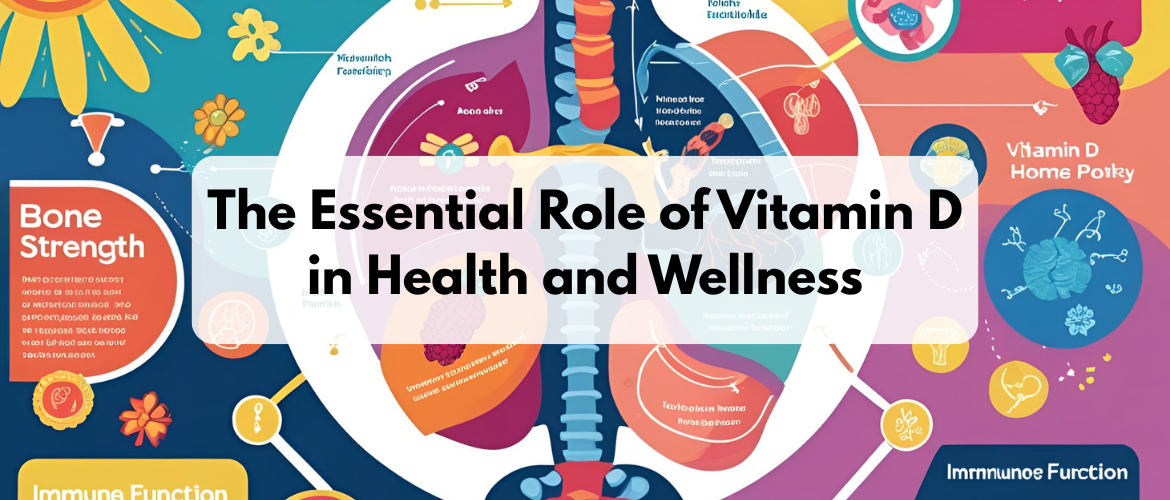No products in the cart.
The Essential Role of Vitamin D in Health and Wellness

Vitamin D, often referred to as the “sunshine vitamin,” is a crucial nutrient that plays a vital role in maintaining overall health. Despite its importance, many people in the United States suffer from Vitamin D deficiency due to limited sun exposure, dietary gaps, and lifestyle factors. This deficiency can lead to various health concerns, including weakened bones, compromised immune function, and increased risk of chronic diseases. Understanding the benefits of Vitamin D, its sources, and how to maintain optimal levels is essential for long-term wellness.
The Science Behind Vitamin D and Its Functions
Vitamin D is a fat-soluble vitamin that helps regulate calcium and phosphorus levels in the body. It is unique because, unlike other vitamins, the body can produce it when exposed to sunlight. However, factors such as sunscreen use, geographic location, and indoor lifestyles can limit natural Vitamin D synthesis. This vitamin is essential for several bodily functions, including:
Bone Health and Calcium Absorption
One of the primary roles of Vitamin D is to facilitate calcium absorption in the intestines. Without adequate Vitamin D, the body struggles to absorb calcium efficiently, leading to weakened bones and an increased risk of osteoporosis. This is particularly important for older adults, as bone density naturally declines with age. Ensuring sufficient Vitamin D intake can help maintain strong bones and reduce the likelihood of fractures.
Immune System Support
Vitamin D plays a significant role in modulating the immune system. Research suggests that adequate levels of Vitamin D can enhance the body’s ability to fight infections, including respiratory illnesses. It helps regulate immune responses, reducing inflammation and supporting the body’s defense mechanisms against pathogens.
Heart Health and Blood Pressure Regulation
Studies indicate that Vitamin D may contribute to cardiovascular health by improving blood vessel function and reducing inflammation. It has been linked to lower blood pressure levels and a decreased risk of heart disease. While more research is needed, maintaining optimal Vitamin D levels appears to be beneficial for overall heart health.
Mood and Mental Well-Being
Vitamin D deficiency has been associated with mood disorders, including depression and anxiety. This is because Vitamin D influences neurotransmitter function and brain health. Individuals with low Vitamin D levels often report feelings of fatigue, low energy, and mood instability. Supplementing with Vitamin D or increasing sun exposure can help improve mental well-being.
Muscle Function and Recovery
Vitamin D is essential for muscle function, as it helps regulate calcium levels within muscle cells. Athletes and active individuals benefit from adequate Vitamin D intake, as it supports muscle strength, reduces inflammation, and aids in post-exercise recovery.
Sources of Vitamin D
Sunlight Exposure
The most natural way to obtain Vitamin D is through sun exposure. When the skin is exposed to ultraviolet (UV) rays, it synthesizes Vitamin D. However, factors such as sunscreen use, seasonal changes, and geographic location can limit this process. Experts recommend spending 10-30 minutes in direct sunlight several times a week to maintain healthy Vitamin D levels.
Dietary Sources
While few foods naturally contain Vitamin D, some of the best sources include:
- Fatty fish (salmon, tuna, mackerel)
- Egg yolks
- Beef liver
- Cheese
- Mushrooms exposed to UV light
Fortified Foods
Many foods in the US are fortified with Vitamin D to help individuals meet their daily requirements. These include:
- Dairy products (milk, yogurt)
- Plant-based milk alternatives (soy, almond, oat milk)
- Breakfast cereals
- Orange juice
Supplements
For individuals who struggle to get enough Vitamin D from sunlight and food, supplements can be an effective way to maintain optimal levels. Vitamin D3 (cholecalciferol) is the preferred form, as it is more bioavailable than Vitamin D2 (ergocalciferol).
Recommended Daily Intake of Vitamin D
The recommended daily intake of Vitamin D varies by age and health status:
| Age Group | Recommended Daily Intake (IU) |
|---|---|
| Infants (0-12 months) | 400 IU |
| Children (1-18 years) | 600 IU |
| Adults (19-70 years) | 600 IU |
| Adults (71+ years) | 800 IU |
| Pregnant & Breastfeeding Women | 600 IU |
While these guidelines provide a general recommendation, individual needs may vary based on factors like skin tone, geographic location, and existing health conditions.
Signs of Vitamin D Deficiency
Vitamin D deficiency is common, especially in regions with limited sunlight. Symptoms may include:
- Fatigue and low energy
- Bone pain or muscle weakness
- Frequent infections
- Mood changes, including depression
- Slow wound healing
If you suspect a deficiency, consult a healthcare provider for testing and personalized recommendations.
Future Trends in Vitamin D Research
Ongoing studies continue to explore the broader impact of Vitamin D on health. Emerging research suggests potential benefits in areas such as:
- Cancer Prevention: Some studies indicate that Vitamin D may help reduce the risk of certain cancers.
- Longevity & Aging: Research is investigating how Vitamin D supports healthy aging and reduces inflammation.
- Brain Health: Scientists are studying its role in cognitive function and neurodegenerative diseases.
Conclusion
Vitamin D is an essential nutrient that supports bone health, immunity, heart function, and mental well-being. While sunlight is a natural source, many people require dietary intake or supplements to maintain optimal levels. By prioritizing Vitamin D through sun exposure, nutrient-rich foods, and supplementation when necessary, you can take proactive steps toward better health and longevity.
Stay informed, stay healthy, and make Vitamin D a key part of your wellness routine.
Start your wellness journey today — Visit Unike Nutra Now
Follow us
Facebook – https://www.facebook.com/profile.php?id=61567462823245
Instagram – https://www.instagram.com/unikenutra/
Twitter – https://x.com/Unikenutra
LinkedIn: https://www.linkedin.com/company/unike-nutra/
Amazon: https://www.amazon.com/stores/UnikeNutra/
